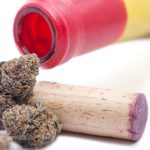You’ve heard about cannabis-infused craft beer and weed-infused whiskey, but what about weed-infused wine? According to recent developments in the financial sector, Millennials are gravitating more towards weed and wine than beer. With this advent, why haven’t we seen more of an emerging market combining the two?
While pot wine has been around for decades—as the Los Angeles Times reported, wineries have been making wine injected with cannabis since the late ’70s, with Chalone Winery near Pinnacles National Monument recorded as the first—it seems that it has yet to find its foothold in a wider market. So why has it not grown into more than a fledgling, niche industry? The answer is a bit more complicated than you’d think.
Like many of the big-name businesses that have emerged over the past few years, the weed-infused wine industry seems to be centered in California. Considering that the Golden State is the home of Napa Valley, perhaps the best-known wine growing region in the country, this makes sense, but there are also other factors to consider. The main one? For entrepreneurs, it’s legality. This, too, is seemingly why cannabis-laced wine has not reached a larger, national market.
As Cosmopolitan noted in a 2016 article, most pot wine—or “green wine,” as sommeliers call it— grown in the state can only be sold there as well. When it boils down to it, the reason is two-fold. Cannabis is still considered a Schedule I drug at a federal level, meaning that transportation of goods across state lines could feasibly be recognized as a federal offense. But in-state trade in California, where weed has been both decriminalized and legalized for recreational use, means that local wineries are free to pursue the market as they please.
In addition to this, there is also the particularities of environment when it comes to cultivating wine grapes and processing them for a distilled final product. Unlike the weather challenges wineries face in other legal weed states like Colorado, California’s climate is optimal for the art of winemaking.
So now we know the limitations of the wine-and-weed market, but what about why people make it in the first place? Ostensibly, the point would be primarily a recreational one. That being said, can weed-infused wine even get you high?
Unlike the recent spate of cannabis-infused beers, green wine not only provides consumers with the normal buzz you expect from your favorite cab sauv or pinot but a THC-induced psychoactive effect as well.
The level of THC retention in weed wine is due to the same temperatures used to ferment wine. As the Los Angeles Times explained: “…fermentation temperatures rarely exceed 90 degrees. This is high enough to release cannabinoids (one of many active agents in pot) but not high enough to ‘decarboxylate,’ or release, the THC, the most psychoactive substance in marijuana.”
In terms of bodily effects, what does this mean a green wine imbiber can expect? A nice balance between the two.
“What’s nice about it is how subtle it is,” said in Pax Mahle, a winemaker based in Sonoma, in an interview with LAT last year. “There’s a little flush after the first sip, but then the effect is really cheery, and at the end of the night you sleep really well.”
And as with most cannabis-based products, an extra plus to green wine includes the aforementioned cannabinoids found in weed, which helps with health issues that range from anxiety to headaches to Crohn’s disease.
“It really is the best of both worlds; you get delicious wines with medicinal benefits,” she added.
So, are there any pitfalls when it comes to green wine?
For all intents and purposes, it seems to have a plentitude of pros, but there’s one major, obvious, and outstanding con: the toll it can take on your wallet. As per the Los Angeles Times, weed-infused wine can cost anywhere from $120 to $400 for a half-bottle.
That’s right, a half-bottle. Luxury is as luxury does, we suppose. So depending on what your annual income is, the only “pour” decision you might make when it comes to green wine is spending a lot more on it than you can actually afford.
But to most, the cost is worth it.
“I think that an herb-infused wine might be the sort of beautiful bridge to helps us to understand where cannabis fits in our culture,” famous singer-songwriter Melissa Etheridge, who runs her own green wine company Know Label, told reporters last year. “Who’s to say an herb-infused wine isn’t just the medicine a person is looking for at the end of the day?”
(1074)





Leave A Reply